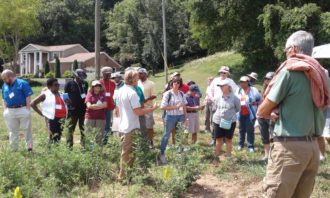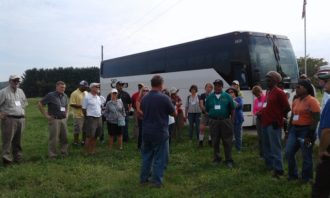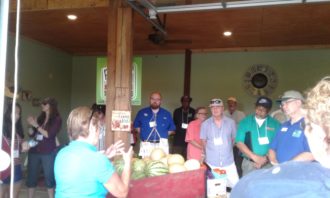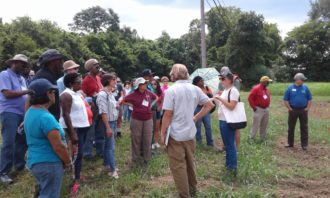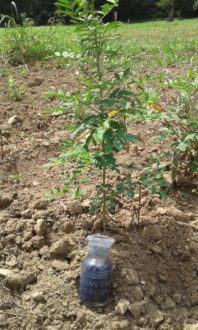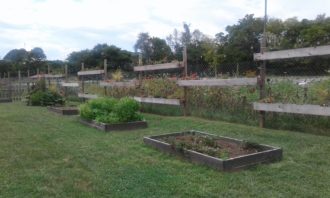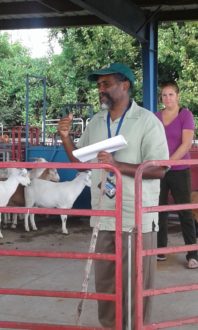NASHVILLE, Tennessee – Sustainable agriculture is growing in Tennessee and members of the Southern Sustainable Agriculture Research and Education (SSARE) program got a glimpse recently of the innovations, research, and marketing and productions methods driving that growth.
Nearly 50 SSARE staff, members of the Administrative Council, and state ag coordinators were treated to a daylong farm tour through middle Tennessee August 2 as part of the regional program’s annual summer meeting. The SARE program is a competitive grants and education program operating in every state and island protectorate. Four regional offices run the program, each guided by an Administrative Council that makes grants and sets regional priorities.
This was the first SSARE visit to Tennessee in over 10 years and the tour offered the group the opportunity to observe a cross section of sustainable methods and models at several area farms and at Tennessee State University.
The first visit was Delvin Farms, a 120-acre USDA Certified Organic farm in College Grove, TN. The farm offers CSA shares, attends five farmers markets, and has just opened an on-farm store this year. SSARE participants commented on the multi-generation success of Delvin Farms. They specifically noted the Delvins’ innovative, and changing, farming methods for over 40 years, which moved from conventional farming to more sustainable methods, including USDA organic vegetables, CSAs, farmers markets, and a partnership with Tavalin Tails offering meat products. Learn more about Delvin Farms at https://delvinfarms.com/.
Earlier this year, SSARE awarded a Producer Grant (FS17-295) to the next farm visited, Stony Creek Colors. Founder Sarah Bellos is growing natural indigo north of Nashville to replace synthetic dyes for the clothing industry.
Bellos stated that indigo is a sustainable crop—it improves the health of people and ecosystems. Stony Creek has its own processing facility in Springfield, TN and is contracting with farmers to grow indigo (some who are now growing indigo instead of tobacco). By transitioning acreage to indigo, Stony Creek is protecting farmland, bringing economic security to family farmers, and improving the health of farmland and society. Learn more about Stony Creek Colors at https://stonycreekcolors.com/.
For lunch, the tour group stopped at The Old School Farm and Restaurant. This site includes a two-acre vegetable and poultry farm using sustainable farming methods; the restaurant (serving produce from the farm); an event barn; and the offices of MillarRich, which specializes in providing Family Model Residential Services to individuals with intellectual disabilities. Some of these individuals (with their life coaches) work on the farm to provide CSAs in the Bells Bend area of Nashville and attend farmers markets. Learn more about The Old School at https://www.theoldschoolnashville.com/.
The last stop was at Tennessee State University to view the meat goat research conducted by research animal scientist Richard Browning. Since 2001, the meat goat research has focused on genetic evaluation for fitness and performance in the Southeastern US. Some of that work was funded through a SSARE Research & Education Grant (LS13-254).
The research herd is comprised of approximately 250 breeding does and herd sires on 80-plus acres of pastureland along the Cumberland River. In 2015, a herd of Dexter cattle was started to complement the meat goatherd. TSU focuses on profitability of small farms, which constitutes 70 percent of farms in the U.S.
The SSARE region is made up of 13 states, and Puerto Rico and the U.S. Virgin Islands. SSARE's mission is to advance—to the whole of American agriculture—innovations that improve profitability, stewardship and quality of life by investing in groundbreaking research and education. Since 1988, SSARE has funded more than 1,000 projects totaling over $59 million.
Article written by SSARE Administrative Council member John Patrick. Photos by SSARE Administrative Associate Sandra Young.
Published by the Southern Region of the Sustainable Agriculture Research and Education (SARE) program. Funded by the USDA National Institute of Food and Agriculture (NIFA), Southern SARE operates under cooperative agreements with the University of Georgia, Fort Valley State University, and the Kerr Center for Sustainable Agriculture to offer competitive grants to advance sustainable agriculture in America's Southern region. This material is based upon work that is supported by the National Institute of Food and Agriculture, U.S. Department of Agriculture, through Southern Sustainable Agriculture Research and Education. USDA is an equal opportunity employer and service provider. Any opinions, findings, conclusions, or recommendations expressed in this publication are those of the author(s) and do not necessarily reflect the view of the U.S. Department of Agriculture.
